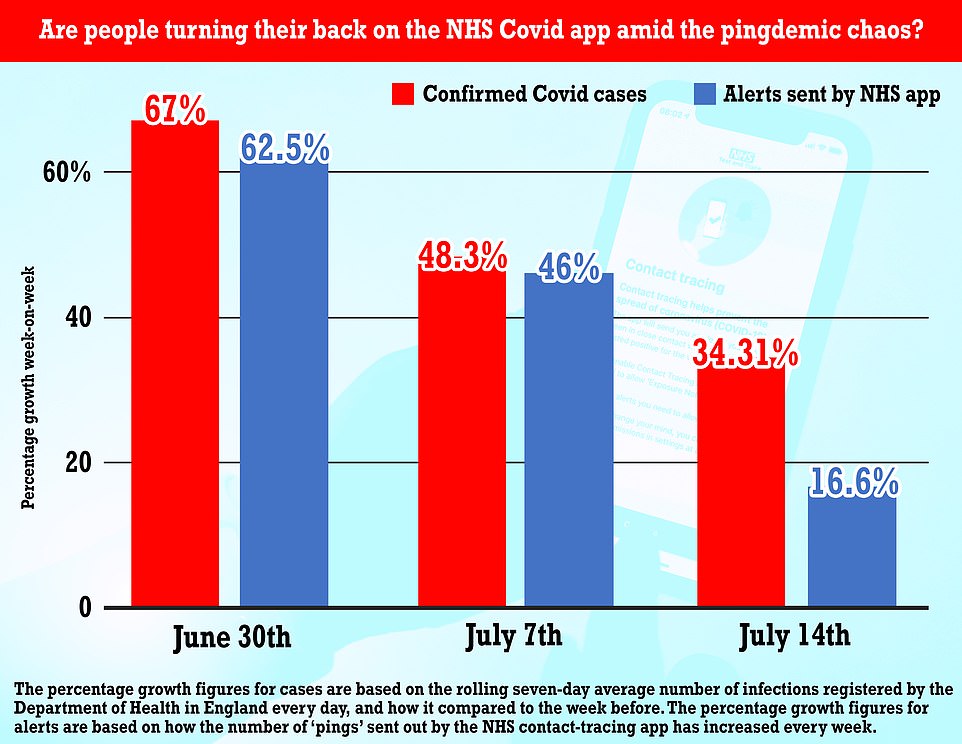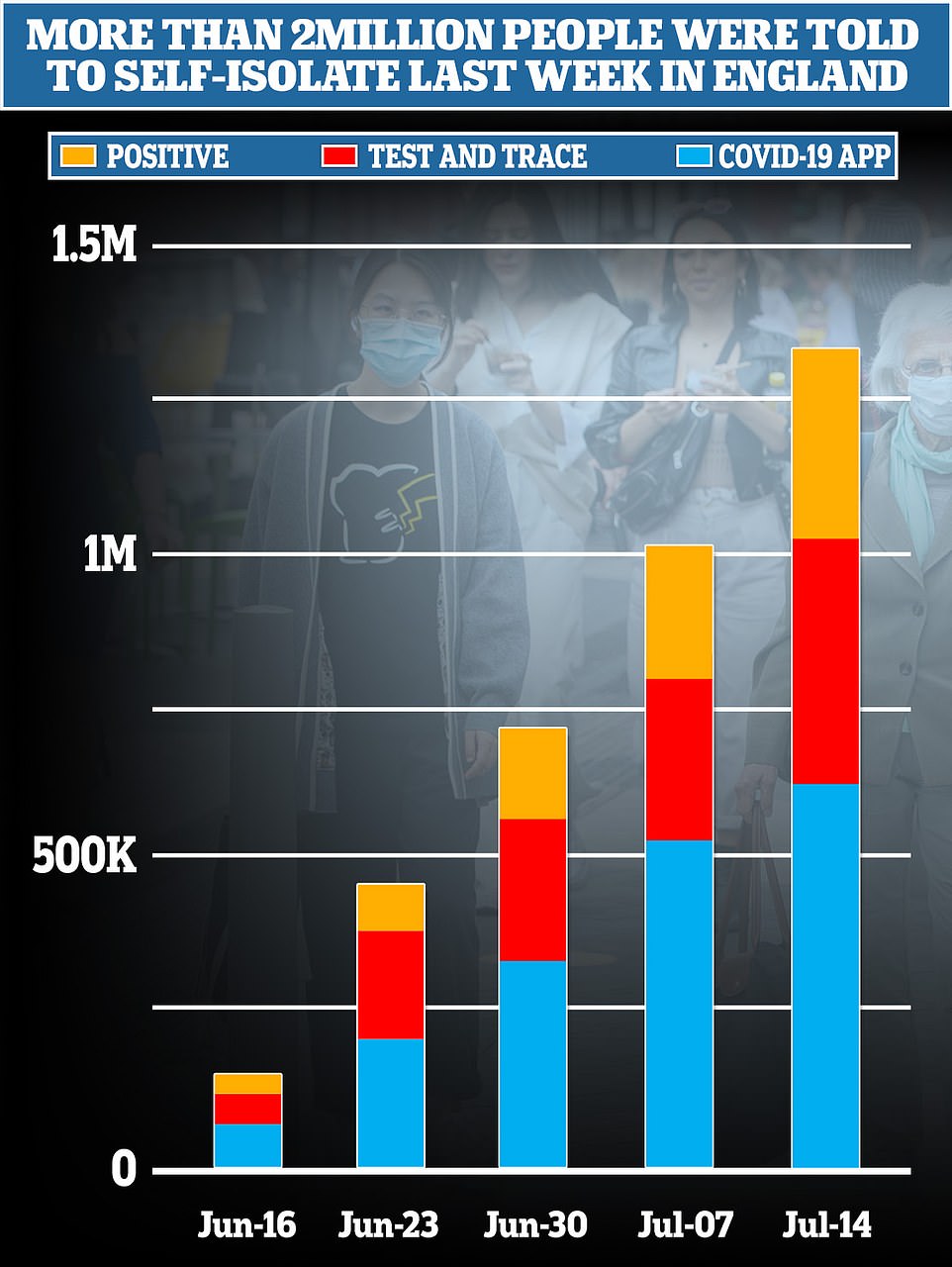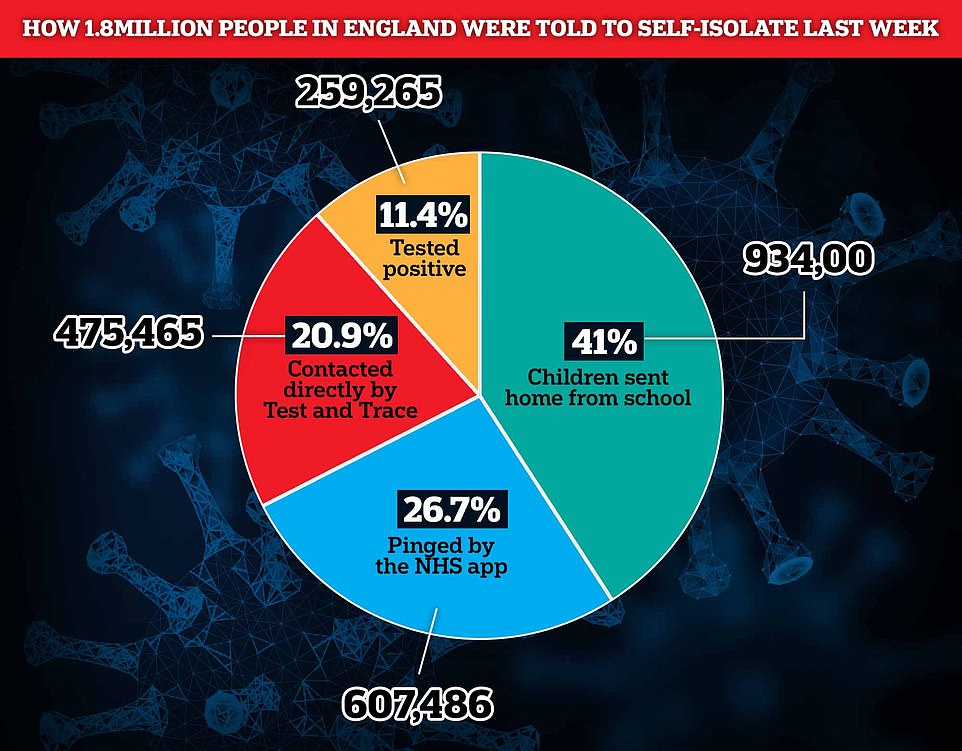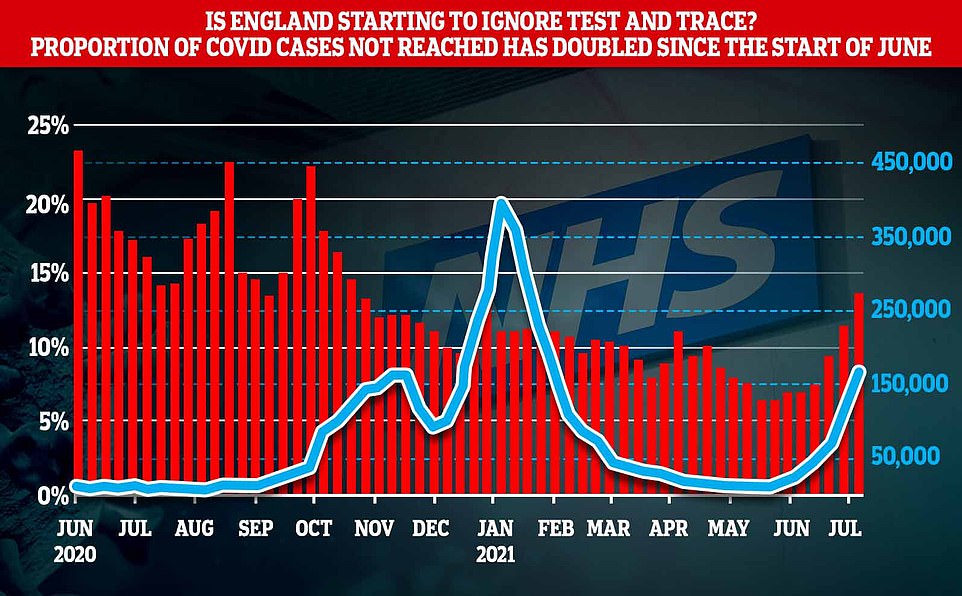More than 600,000 alerts telling people to self-isolate were sent out by the NHS Covid app in England and Wales last week as the ‘pingdemic’ continued wreaking havoc on businesses today.
NHS data shows 618,903 alerts were sent across the two countries in the week ending July 14, a 17 per cent rise on the previous seven days and another record-high.
Typically, the number of people ‘pinged’ has risen in line with infections. But Covid cases in England jumped by a third in the week to July 14, in the first clear sign that tens of thousands of people have deleted the app to avoid being asked to quarantine at home.
There has been mounting pressure for weeks on the government to tweak the sensitivity of the software or speed up self-isolation exemptions for key workers and fully vaccinated Britons, with the rules not due to come into force until August 16.
Tory MP Mark Harper said signs Brits were ditching the app, which only offers advice and isn’t legally enforceable — unlike instructions given from actual Test and Trace call handlers, were ‘dangerous for public health’ as he urged the government to bring the relaxation forward.
Welsh Conservative MP David Jones described the pings as a ‘prison sentence’ for fully vaccinated people. ‘Urgent policy change needed, or the economy will grind to a standstill,’ he tweeted.
Former Health Secretary Jeremy Hunt said No10 was on the brink of losing the public’s trust in the software and demanded the 10-day isolation period for double-jabbed Brits be ‘scrapped immediately’.
Shelves at major supermarkets laid empty this morning as the Covid app piled pressure on supply chains. Shops and businesses across the UK are also struggling with staffing levels and petrol stations have also been forced to close because they can’t get fuel delivered.
Data today laid bare just how bad the fiasco has become, with around 1.3million self-isolation alerts sent out last week, including the 600,000 ‘pings’. Another 420,000 people were told to quarantine at home by Test and Trace call handlers, while 260,000 tested positive.
However, some people pinged by the app would have also been contacted by Test and Trace. And some of those who tested positive may have already been told to self-isolate.
Business Secretary Kwasi Kwarteng today revealed No10 was preparing to U-turn and rush out a list of industries allowed to ignore contact-tracing alerts later today – less than 48 hours after Downing Street insisted there would not be one.

Data shows 618,903 alerts were sent in England and Wales in the week ending July 14, a 17 per cent rise increase on the previous seven days and another record high. The red line show the cumulative number of tracing alerts sent throughout the pandemic, while the blue bars represent the number each week

Infections were rising in England by about 67 per cent on June 30, for example, and at the same time the number of alerts sent to phones rose by 63 per cent. Even earlier this month ‘pings’ were rising in line with cases – infections rose by 48 per cent on July 7 while alerts jumped by 46 per cent. But by July 14, cases across England were rising at twice the rate of alerts – with a 34 per cent increase in infections compared to the 17 per cent rise in pings that reached phones

There are fears that as the epidemic continues to grow and isolation rules aren’t relaxed for double-jabbed Britons, that it is creating a lockdown by stealth. More than 1.2million adults were told to self-isolate last week. The blue bars show the number of ‘pings’ sent by the NHS app each week, the red bars show the number of people contacted by Test and Trace call handlers, while the yellow bars show the number of people who tested positive for Covid

In total, when children sent home to isolate from school are included, there were up to 1.8million people told to quarantine last week – or 3 per cent of the entire population. However, some people pinged by the app would have also been contacted by Test and Trace. And some of the people who tested positive may have also been pinged or told to self-isolate

This graph shows the proportion of Covid-positive cases who were not reached and asked to self-isolate by NHS Test and Trace (red), and the total number of cases transferred (blue). Test and Trace missed 14 per cent of Covid-infected people in England two weeks ago, the most since the start of the second wave

A long run of empty shelves in Lidl, Saltash, Cornwall as the ‘pingdemic’ grips the country forcing thousands of supermarket workers and lorry drivers into quarantine. The ‘Middle of Lidl’ section is usually piled high with bargains

The frozen fish section at a Morrisons in Manchester as supermarket shoppers complained of shortages of some products
The NHS figures suggest that Britons are finally starting to turn their back on the app, following weeks of polling showing significant chunks of the country were considering deleting it.
Infections were rising in England by about 67 per cent on June 30, for example, and at the same time the number of alerts sent to phones rose by 63 per cent.
Even earlier this month ‘pings’ were rising in line with cases – infections rose by 48 per cent on July 7 while alerts jumped by 46 per cent.

Every week a record number of people in England are being ‘pinged’ and told to self-isolate by the NHS Covid app
Boss of food firm supplying prisons, hospitals and schools admits he has told ‘pinged’ staff they don’t have to self-isolate after a negative test so they can deliver their daily orders
One of Britain’s largest food distribution firms is advising workers who are pinged by the NHS app to take tests and continue working, in breach of the Government advice, it was revealed today.
Bidfood chief executive Andrew Selley defended his approach for delivery drivers to continue working if they have negative results as ‘appropriate and safe’ because they are ‘critical workers’.
He said the firm, whose customers include hospitals, has heard no information about how to apply for an exemption for some fully-vaccinated staff to avoid quarantine under new plans to ease the ‘pingdemic’.
Amid a ‘real challenge’ in completing orders on time, he said workers are being asked to follow a testing regime if they receive an alert from the app as a close contact.
‘We know that they’re critical workers as part of the food supply chain, so if people are obviously positive or contacted by Test and Trace then they will have to isolate,’ he told BBC Radio 4’s Today programme.
‘If they are pinged we ask them to take a PCR test, if that’s positive then clearly they’ll isolate, but if it’s negative we ask them to come back to work and we have a process of doing lateral flow tests daily away from their workplace, and if that’s negative they can proceed with their work.’
Ministers have confused the rules this week, but, as they stand, isolating for 10 days after an alert from the app is the official advice from the Government, but it is not a legal obligation like if contacted by Test and Trace.
Told his testing programme is contrary to Government advice, Mr Selley said: ‘We think that’s appropriate and safe. The ping is advisory’.
Is your business doing the same? Email [email protected] Advertisement
But by July 14, cases across England were rising at twice the rate of alerts — with a 34 per cent increase in infections compared to the 17 per cent rise in pings that reached phones.
Mr Harper said: ‘Given it is safe on the August 16 because that’s the Government’s policy, can we not just implement it now?
‘The danger is large numbers of people will either delete or stop listening to the app and then we get to August 16 they won’t be getting the advice to take a PCR test and we will have actually made ourselves less safe and less well protected.
‘So, I urge the minister to think again, bring it forward now, people will then be taking tests when they’re advised to, otherwise I think people will simply stop listening and that’s very dangerous for public health.’
His comments were echoed by My Hunt, who urged the Government to speed up exemptions for fully vaccinated people.
Posing a question to vaccines minister Nadhim Zahawi in the Commons today, he said: ‘Does he not think it’s time for the Government to listen to public opinion and scrap the 10-day isolation requirement immediately for people who are pinged who have been doubled-jabbed in favour of having to isolate until they have done a negative PCR test, otherwise we risk losing social consent for this very, very important weapon against the virus.’
It comes as MailOnline readers shared pictures of empty shelves in dozens of supermarkets across the UK in the past 24 hours, which has been blamed on staff crises triggered by the app.
Sainsbury’s, Tesco, Lidl, Morrisons, Asda, M&S and Waitrose are also seeing significant gaps on the shelves in most aisles, but specifically wine, frozen food, fresh meat such as minced beef, dairy products such as cheese, pizzas, bottled water, fruit, vegetables and packaged salads and cooked meats.
Iceland boss Richard Walker has warned that Britain’s creaking food supply chains are on the brink of collapse causing shortages of products in shops with 1,000 of his staff — almost one in 20 — among 1.7million Britons currently stuck at home.
Mr Kwarteng has admitted he is ‘concerned’ about food supply issues but urged shoppers not to ‘panic buy’ and said he ‘can’t guarantee’ the ‘pingdemic’ won’t continue beyond August 16 – when rules are due to be dropped for the double jabbed.
Shops and businesses across the UK are also struggling with staffing levels and petrol stations have also been forced to close because they can’t get fuel delivered. Sandwich chain Pret A Manger has temporarily closed 17 shops due to staff being forced to self-isolate.
UK supermarkets are is in a midst of a perfect storm of problems with tens of thousands of workers self-isolating because of the NHS app. The struggle to stack shelves and staff stores and warehouses is being made worse by a lack of lorry drivers to deliver food.
The Road Haulage Association believes the country is 100,000 HGV drivers short – and thousands of prospective drivers are waiting for their HGV tests due to a backlog caused by lockdown, while many existing ones have returned to the EU from the UK after Brexit.
Mr Kwarteng said: ‘We are going to announce a list of exempt workers’, but warned: ‘The list will be quite narrow’ and he would not ‘pre-empt’ the list when asked if the food industry would be on it.
He told BBC Radio 4’s Today programme: ‘I don’t think it’s a question of applying for this. We’re going to be publishing guidance today on who might be exempt. We’re looking at different sectors and we will be publishing today the sectors that will be affected.’
The release of a list of exempt industries marks a U-turn by the Government, who previously said it would be done on a ‘case by case’ basis.
The PM’s official spokesman said on Tuesday: ‘We’re not going to be producing a list covering individual sectors, these business-critical areas will be able to apply for exemptions to their host departments.’
The Business Secretary also contradicted his junior business minister Paul Scully, who earlier this week said it was a decision for individuals and employers whether they should isolate after a ‘ping’ from the NHS Covid-19 app.
Mr Kwarteng said: ‘The rule is very clear, we should self-isolate. It’s as simple as that. If you are pinged, you should self-isolate. I’m not going to countenance people breaking the rules or anything like that. I think they should just follow them’.

Royal Mail has also seen an increase in absences due to staff having to self-isolate, and this morning announced delays to deliveries in 10 parts of England
It came as businesses, including one of Britain’s largest food distribution firms, Bidfood, began taking the crisis into their own hands and advising workers who are pinged by the NHS app to take tests and continue working rather than stay at home for up to ten days.
Iceland boss Richard Walker said Iceland’s ‘double pronged problem’ of staff shortages and a lack of lorry drivers is forcing them to draft in 2,000 temporary workers to keep the business running.
He said: ‘We are seeing some availability issues and it is now very challenging to keep our shops open and keep lorries on the road to our shops to supply food with staff in there to serve the customers. We’ve shut two stores and have reduced hours in others. It is ironic that we’ve worked so hard to as a nation – and a business, our staff have been nothing short of heroic, to keep this show on the road and we kept every single shop open throughout the pandemic’.
He added: ‘There is absolutely no need to panic buy… the people who should be panicking are the government’.
Demanding immediate action from Boris Johnson’s ministers, Mr Walker said: ‘We’re being forced to limit our service, not because of the virus itself, but because of the system we’ve created around the virus and that’s why we need urgent clarity from the Government and we need that key worker list to contain retail workers and HGV drivers – the unsung heroes who keep our economy turning’.
A Co-op spokesman said: ‘We are sorry that we are running low on some products. Like many retailers, we are impacted by some patchy disruption to our deliveries and store operations but we are working closely with our suppliers to get re-stocked quickly.’
A Sainsbury’s spokeswoman said: ‘We are working hard to ensure customers can find what they need. While we might not always have the exact product a customer is looking for in every store, large quantities of products are being delivered to stores daily and our colleagues are focused on getting them on to the shelves as quickly as they can.’
Rears Covid passports and ‘pingdemic’ could shut nightclub doors again
Approximately 100,000 punters are expected to let their hair down as clubs across the country will hold hundreds of club nights and events in the first full week of freedom.
Tens of thousands of young people in London, Birmingham, Leeds, Manchester and Liverpool are set to dance the night away in clubs and bars for the first time in 16 months.
On popular online ticket selling platforms such as Fatsoma and Eventbrite, there are over 200 clubbing events lined up in big party cities across the UK, including London, Birmingham, Manchester and Leeds.
Partygoers can expect a big night out every day this week, with venues desperately organising over 200 events in major party cities in the UK – as they hope to pile in as many punters as possible to make up for lost revenue over the last 16 months.
Venues are gearing up to host thousands inside packed – and largely sold out – clubs, pubs and bars across the nation throughout the week after most legal restrictions on contact were eased on ‘Freedom Day’.
But, fears persist over the lingering threat of Covid passports and potential impact of the so-called ‘pingdemic’ – with more than 1.7m people understood to be self-isolating at present.
Several club nights advertised the return of pre-pandemic freedoms, with some setting lofty targets of attracting more than 1,000 patrons back through their doors.
Using numbers shared on popular online ticket sales websites, there could be close to 70,000 revellers enjoying club nights in major party hubs across the UK if the venues operate at full capacity and can attract punters in droves.
Long queues could be seen stretching for hundreds of metres at venues across the country as the clock ticked down to midnight on Sunday, July 18.
In a jubilant night described by some as ‘feeling like New Year’, tens of thousands of party-goers across England piled onto dance floors for the first time since March 2020.
Crucially, they were allowed to party without being required to provide Covid passports or negative Covid test results.
Face masks are also no longer legally required, and with social distancing rules shelved, there are no limits on people attending.
Venues including Fabric, E1, Ministry of Sound and Egg nightclubs in London, Pryzm in Brighton, Powerhouse Night Club in Newcastle and Moon Acre in Dorset re-opened on the stroke of midnight – the very second that most legal restrictions on social contact were removed.
The Astoria nightclub in Portsmouth, Hampshire, attracted 2,500 people for the first full night of dancing and fun after their brief 3-hours of opening just after midnight.
Advertisement
Source link : https://www.dailymail.co.uk/news/article-9813887/Pingdemic-chaos-hits-record-high-600-000-alerts-sent-week-England.html











